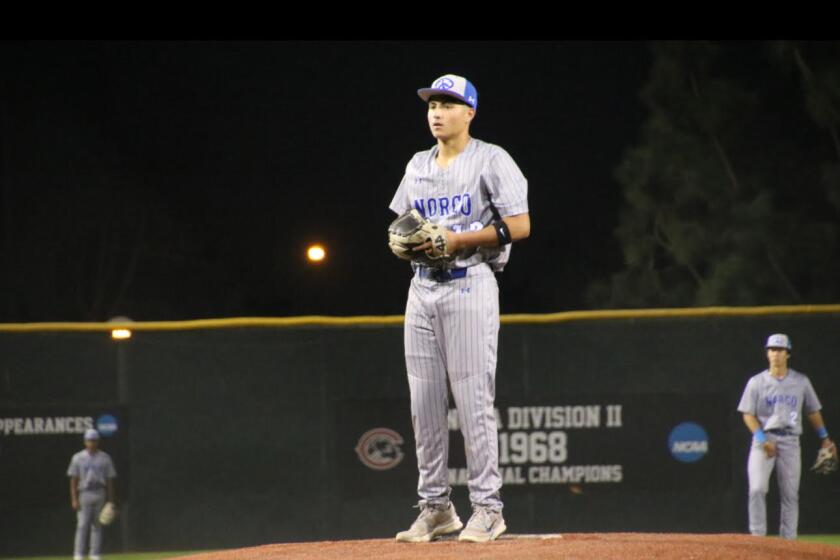Q&A;: Top-fuel driver Antron Brown on verge of making NHRA history
- Share via
Antron Brown is on the cusp of history.
The National Hot Rod Assn. top-fuel driver holds a 65-point lead on teammate Tony Schumacher heading into this weekend’s season-ending Auto Club Finals at Fairplex in Pomona.
Brown, a former standout junior-college sprinter from Indianapolis, can win not only his first top-fuel title, but become the circuit’s first African American champion.
The 36-year-old driver previously raced motorcycles on the NHRA tour after being selected a rider on a team owned by former NFL player Troy Vincent, who was married to Brown’s cousin. Brown has won six times in the dragster this season and would like to close the effort with another triumph in the Southland.
What’s the significance to you of becoming the first African American top-fuel champion?
“I never thought of it that way. I just thought of being a champion. We look around at each other here as great teams. I know I used to look at” 15-time funny-car champion “John Force, a former truck driver who became a team owner, and Don Garlits as guys who gave me hope in this sport, because they’re just normal dudes. Coming from Trenton, N.J., to do what I’ve done, if I can give someone hopes, to shed some light on what I do and the fact I’m just a normal guy with a mom who worked at the post office and whose dad was active Army, that’s great.”
How did you make your way from Trenton to NHRA?
“My dad, Albert, and uncle, Andre, started a race team in the sportsman series, doing bracket racing at local tracks, first with a 1974 Vega.”
They souped up a Vega?
“Yes, they did. They put a small-block 350 in it and got it,” to run a quarter-mile, “in nine seconds, 140 mph. They’d race at Atco and Englishtown in New Jersey, Maple Grove in Pennsylvania. I was born in 1976, and I remember they got their first car out to California in 1981. My dad might make it out to Pomona again for this.”
It sounds as if what you’re saying is that what should be taken from your championship is the accessibility NHRA offers to the common man?
“I just think in this day and age we’re in … drag racing is not like NASCAR. People make a big deal there about racial diversity, women in racing. I think NHRA has viewed it as, ‘We’re all Americans.’ Look at this sport’s history. Shirley Muldowney was racing in the 1970s. My dad and uncle could go buy a Vega and go racing, and were welcomed. Our sport never had this problem. It’s always been about that if people can afford $3,000 to $5,000 to go soup up an old car, they can race here. Our sport has always been grass-roots. It’s just not that big of a deal to me. I’d rather give the accolades to my team.”
I know the title’s not clinched yet, but what race or what moment can you point to as the one you believe you felt like you won it?
“In Reading, Pa.,” last month, “we came in with a 20-point lead, but set a world record,” with an elapsed time of 3.722 seconds, “to make it a 100-point gap on second place. Las Vegas wasn’t nice to us, but we had a big enough cushion from Reading to still sneak out with the lead. We still have to close it out, though.”
What have you proved to yourself with the accomplishments of this season?
“You know, we’ve almost repeated how we did last year, when we came to Pomona only eight points out but got beat in the second round by Larry Dixon by three-thousandths of a second when he did the best elapsed time all weekend. Anyone else, we would’ve beat that round. But he beat us. It was one of those deals. It wasn’t meant to be.”
So did you have an attitude this year of no mercy, intent to never let it be that close this time?
“Our deal was to go on a spree in the Western swing, and we won in Denver and Sonoma. Then we qualified No. 1 and won in St. Louis,” in late September, “and that set us up even more. We kept going at it, breaking the world record in Reading while,” then-runner-up “Spencer Massey lost in the first round.”
The dragster’s speed is more than 325 mph. What’s being in that car like? Is it old hat now, or always a thrill?
“The speed is not what gets you, it’s the acceleration. That sets you back, those five Gs. It’s a thrill every time.”
You said when you were a sprinter, you wanted to be a racer, and when you rode motorcycles, your “ultimate dream” was to race in top fuel. How did you achieve this?
“The only thing that translated from motorcycles was the methodology of how to race — the pressure, hitting the tree” when the green light flashes. “I had to learn how to trust the car. I’ve been blessed with great crew chiefs, Brian Corradi and former funny-car champion Mark Oswald. We lean on each other. The brain pull on this team is incredible, in tuning the car and providing the skill set to give me a hint like, ‘It’s a long light.’ It’s like having a caddie, another set of eyes.”
How badly do you want the exclamation point of winning at Pomona atop winning the title?
“It’d set the tone for the whole off-season, a double bonus to what would be the most meaningful day of my whole NHRA career.”
twitter.com/latimespugmire
More to Read
Go beyond the scoreboard
Get the latest on L.A.'s teams in the daily Sports Report newsletter.
You may occasionally receive promotional content from the Los Angeles Times.











